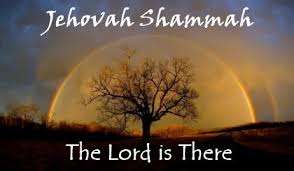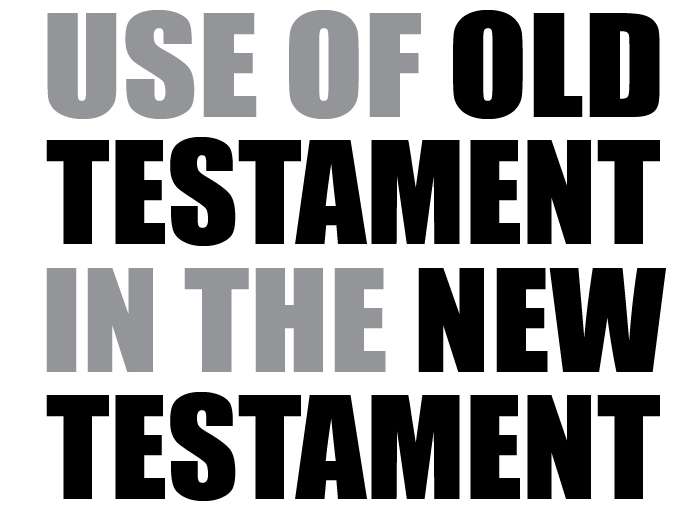

Jehovah-Shammah: The LORD is there
Dr. Geevarughese Mathew
Jehovah Shammah is one of the names of God that we find in the Old Testament. lt is translated as “The LORD is there". We find this name for God in Ezekiel48:35. Actually this name is given to the city of Jerusalem in the vision of Prophet Ezekiel. The meaning and Significance of this name is to be understood in the context of the history of the people of Israel. Ezekiel had a vision about Jerusalem in 574 B.C after the destruction of Jerusalem. After Solomon's reign the kingdom was divided into two, the Southern Kingdom and the Northern Kingdom. The Southern Kingdom was known as Judah with its capital in Jerusalem and the Northern Kingdom was known as lsrael with its capital in Samaria. The Northern Kingdom was Captured by Assyria in 722 B.C and that was the fall of that kingdom. The Southern Kingdom was invaded by the Babylonians in 607 B.C and many were deported including all the best young men from Judah. Daniel was one of such young men who was taken into slavery. They allowed the king of Judah to continue to rule in the South but only if they paid heavy taxes. This happened for about ten years until king Jehoiachin refused to pay taxes and rebelled against the Babylonian kingdom. As a result King Nebuchadnezzar captured Judah and destroyed Jerusalem and the temple in 587 B.C. The people of Judah remained in slavery in Babylon for forty years until they were allowed to return during the Persian Kingdom. A group under the leadership of Zerubbabel were allowed to return to Judah to rebuild the temple in Jerusalem. Another group returned under Ezra in 458 B.C and a third group returned under Nehemiah in 445 B.C. The last two groups helped to rebuild the walls of Jerusalem.
Ezekiel had the vision of the city of Jerusalem during the captivity, and what he was shown wasa temple and city rebuilt with the presence of the LORD there. lt is significant that Ezekiel had this vision when the city and the temple had already been destroyed. The last eight chapters of the book of Ezekiel vividly describes the dimensions and characteristics of the temple and the city which would be restored. The conclusion of his account is found in the last chapter, that the city would no longer be Jerusalem but Jehovah-Shammah which means "the LORD is there".
Like all other names of God in the Old Testament, Jehovah-Shammah also reveals God's unique characteristics and nature in relation to the experience of the people of lsrael. The people experienced God in the tabernacle and the temple. They experienced the presence of God during their wilderness journey with the cloud during the day and pillar of fire during the night. His presence was located in the Ark of the Covenant and the holy of holies in the tabernacle. But during their exile in Babylon, the people felt the absence of God's presence. They felt that the LORD has forsaken them. They believed that the punishment of their sins is not over. They doubted that the LORD no longer loves them. They could not experience the presence of God in the absence of the temple. They could not make expiation for their sins without offering sacrifices. lt is in this context that the significance of the revelation of this divine name Jehovah-Shammah is to be discovered.
What is the relevanceof this divine name in our life today?
First of all, the name reveals that God chooses to dwell in the holy city of Jerusalem. The importance of Jerusalem is much emphasized throughout the Bible. lt is here that Abraham met the priest-king Melchizedek who blessed him and interceded to God for him (Gen.14:18-19). lt is here that David brought the Ark of the Covenant when he recaptured the land of Canaan from the Philistines (2 Sam.6: 12-19). It is here that David and Solomon had their seat of government. lt is in this place that the Jews rebuilt the temple and city walls again after their return from the exile. lt is also significant that later Jesus had his important events in ministry, teaching in the temple, performing miracles and the crucifixion in Jerusalem. The Bible calls Jerusalem, "The throne of God"(Jer.3:17). lt is the vision that God will create a new Jerusalem to be the seat of Christ's power at the end of time (Rev.21). lt is then quite appropriate to name the new Jerusalem as Jehovah-Shammah.
Secondly, the name Jehovah-Shammah reminds us that His presence is always there with us. We should remember that God is with us in our daily life. He is there in our loneliness, in our struggles, and in our difficulties. The Psalmist very beautifully describes it. "God is our refuge and strength, a very present help in trouble (Psalm 46:1). One of the difficult question of theodicy is about God's silence or God's absence in times of trouble. This question is always raised in several Psalms and also in the book of Habakkuk. "How long O LORD? Willyou forget me forever? How long will you hide your face from me? (Ps-13:1). “O LORD how long shall I cry for help, and you will not listen?”(Hab.1:1). A careful study of the Bible affirms that God is more eloquent when he seems to be silent. God is always active and his presence is always with us wherever we may be. Jesus has given us the promise that "l am with you always to the end of the age" (Mat.28:20).
Thirdly, the name Jehovah-Shammah reminds us that the LORD holds our future. Jehovah is there in your future. The future is not known to us. But God is there with us in the future. Bible teaches us that LORD is not confined to a particular place but with people. The concept of the 'God of the Fathers, in the Old Testament describes God as the father of Abraham, lsaac and Jacob. The name YHWH is considered to be the Qallmperfect form of HYH which means '’to exist" or "to be". Therefore the name can be translated in the present or future tense. That means Jehovah is a God of human experience. We understand God not only in our present experience but also in our future. Jehovah-Shammah is a God of the present but also a God of the future, "The LORD is there." The Book of Revelation affirms this futuristic dimension of the understanding of God. "And there will be no more night; they need no light of lamp or sun, for the Lord God will be their light, and they will reign forever and ever (Rev.22:5).




